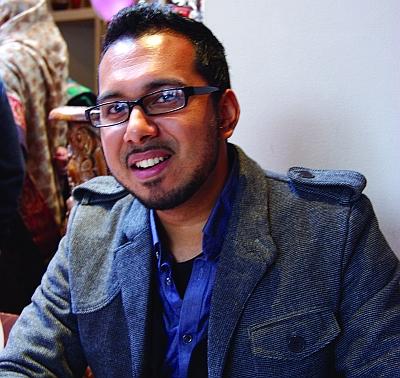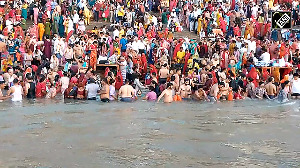There are 2.5 lakh undocumented Indians across the United States. While President Barack Obama’s executive order last week does help, only the US Congress can really address the needs of those caught in the immigration tangle.
Here's the first of a four-part special series on the life struggle of Indian immigrants in the United States by Rediff.com's Arthur J Pais.
After the attorney appointed by his family in New Jersey had got him released on a political asylum petition, the young man spending his first day out of a federal jail near the Mexican border in Texas said he was not waiting for a decision.
“What if I am denied political asylum,” he said. “I better look to marry someone.”
After having sold his land in Gujarat, given $30,000 (almost Rs 19 lakh) to an “agent” who had promised him he would be in America in two weeks, the young man had spent three perilous months flying from India to Cuba, going by a rickety boat from there to Honduras, trekking the rugged terrain there, and beaten up badly by a man because he refused to have sex with him.
The young Indian man had been caught wading through Rio Grande into America.
“I just cannot go back home after all this,” he said.
He even wondered if he should grow a beard, wear a turban and join a man he had befriended on the journey and get lost in a New Jersey town like Carteret, which has a large Sikh population.
“That way they (immigration authorities) won’t recognize me,” he said.
He was on his way to join over 250,000 undocumented Indians across America, some of whom could benefit from the executive order issued by US President Barack Obama on November 20.
As Obama announced his decision that could protect at least 5 million people from deportation, revise visa rules for high-tech workers and revamp a much-criticized programme in which local police helped immigration officials, he asked, ‘Are we a nation that tolerates the hypocrisy of a system where workers who pick our fruit and make our beds never have a chance to get right with the law? Or are we a nation that gives them a chance to make amends, take responsibility and give their kids a better future?’
His announcement is of great interest not only to thousands of employers, but also to immigrant communities including the many undocumented Indian Americans.
Not all of them are like Raman Khanna in Maryland, who despite the fear that his wife and he could be deported any time, has been driving a cab and leading a meaningful life with his wife and two children in Baltimore.
They work, instead, on farms, in Indian restaurants where they are seldom tipped, clean the streets, distribute promotional materials at subways and busy junctions, and drive cabs in the dangerous parts of big cities.
Before the advent of the Internet, hundreds of them worked with Sri Lankan undocumented immigrants running pornographic theaters, sex shops and strip joints.
“We get beaten up so often, people not only cheat us on the fare, but also rob us,” said an undocumented cab driver in Brooklyn.
“One reason for that is muggers and robbers know many of us are undocumented and are afraid to go to the police with complaints.”
A cabdriver in the Bronx (the northernmost of the five boroughs of New York City) was told, after having been beaten up by some hefty teenagers, ‘Back to India, you Bangladeshi refugee.’
The cabbie is Sri Lankan.
According to the US Department of Homeland Security, out of some 11 million (1.1 crore) undocumented people in the country in 2011, 1.5 million (15 lakh) were Asian Americans, with undocumented Indians leading in the growth in the previous decade.
Undocumented Indians numbered 2.4 lakh in 2011 -- up 100 percent from a decade ago -- making India the seventh-highest country of origin for undocumented individuals in the US.
For the same period, the Chinese undocumented people’s number rose from 1.9 lakh to 2.8 lakh, followed by migrants from the Philippines. 
Of these undocumented Asians, at least 4.2 lakh lived in California, 1.95 lakh in New York and 1.02 lakh in New Jersey.
And then there are thousands of people from Trinidad, Guyana and Fiji among the undocumented, who proudly display their Indian heritage.
Some of the undocumented overstayed their work or students visas; some were promised jobs by unscrupulous ‘agents’; few were victims of their husbands suddenly seeking divorce; others took dangerous routes via Mexico and Central America.
A large number of the undocumented live in poverty, and depending on in which state they are living in could be denied driver’s licenses, entry into good schools, and decent jobs.
They live in the shadows, constantly worrying if they will be caught at a workplace or even at a public event and sent back.
Rishi Singh, an articulate and dynamic activist for the undocumented and immigrant rights, knows firsthand what it is to be an undocumented alien in America.
He came to America from Trinidad when he was 10 years old, along with his mother and brother, on tourist visas to meet his father, who had arrived a few months earlier.
His father could not find an employer willing to sponsor him for a visa.

Throughout Singh’s childhood, his parents ‘had no choice other than working in unacceptable situations,’ Singh, who is associated with DRUM in New York, told South Asian Americans Leading Together.
Singh, who has been collecting testimony of young undocumented immigrants, said his parents were ‘underpaid for their long hours, couldn’t take breaks or sick days, and were routinely disrespected because their employers knew they were vulnerable.’
As a senior in high school, when Singh began the college application process just like his classmates, he realized most applications, including scholarships, required a Social Security Number.
‘When I asked my mother what my Social Security Number was, she told me that I did not have one,’ he said.
‘Even though I always knew that we struggled, I did not realize until then the full extent of our struggle or what it would mean for my future. I was not eligible for most financial assistance. Regardless of my academic excellence and drive, I faced barriers beyond my control that would not allow me to succeed in the ways I wanted.’
He often took jobs in construction or catering, where he was paid under the table and often under-compensated for the work.
He got lucky when President Obama sanctioned Deferred Action for Childhood Arrivals two years ago. With the new status, Singh could get better jobs.
“I also decided to be a more vocal activist for undocumented youth in America,” Singh told rediff.com, and “educate others so that they can apply and get status.”
With his roots in the community growing deeper, he was appointed as the New York city coordinator for the People’s Global Action on Migration, Development and Human Rights.
He is now working towards a career in accounting and finance.
Activists like Singh want much bigger action than what Obama has announced in his executive order; and those will have to come from the US Congress.
“This new order won’t bring my parents back,” said Yves Gomes, recounting how his India-born mother was sent back to Kolkata and his father was deported to Bangladesh.
“Where was my family when my younger brother and I wanted them with us all the time, offering us counseling and courage?”











 © 2025
© 2025